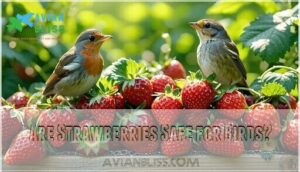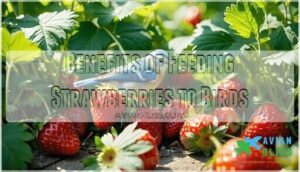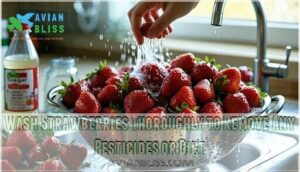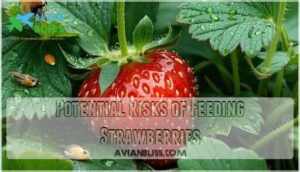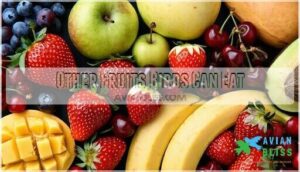This site is supported by our readers. We may earn a commission, at no cost to you, if you purchase through links.

These red gems pack vitamin C, antioxidants, and natural sugars that boost immune systems and provide energy.
You’ll want to wash them thoroughly first to remove pesticides, then cut them into bite-sized pieces to prevent choking. Remove the green stems and leaves before serving.
Most birds go crazy for strawberries’ sweet taste, making them perfect for encouraging natural foraging behaviors. However, moderation is key since they’re high in sugar.
The preparation method you choose can make all the difference in keeping your bird healthy and happy.
Table Of Contents
- Key Takeaways
- Can Birds Eat Strawberries?
- Are Strawberries Safe for Birds?
- Benefits of Feeding Strawberries to Birds
- How to Prepare Strawberries for Birds
- Serving Suggestions for Strawberries
- Potential Risks of Feeding Strawberries
- Other Fruits Birds Can Eat
- Considerations for Feeding Fruit to Birds
- Frequently Asked Questions (FAQs)
- Can I feed my bird strawberries?
- Are any fruits poisonous to birds?
- Are strawberries ok for birds and squirrels?
- Will birds eat strawberry scraps?
- How do you prepare strawberries for birds?
- Can wildlife eat strawberries?
- Can strawberries be fed to baby birds?
- How often should strawberries be given to birds?
- Are organic strawberries better for birds than conventional?
- Can strawberries cause any digestive issues in birds?
- Conclusion
Key Takeaways
- You can safely feed strawberries to your birds as they’re packed with vitamin C, antioxidants, and natural sugars that boost immune systems and provide energy.
- You’ll need to wash strawberries thoroughly to remove pesticides, cut them into bite-sized pieces to prevent choking, and remove the green stems and leaves before serving.
- You should offer strawberries as an occasional treat in moderation since they’re high in sugar – serve them once or twice weekly alongside fresh water.
- You’ll encourage your bird’s natural foraging behaviors by hiding strawberry pieces in toys or scattering them around the cage, making mealtime more enriching and exciting.
Can Birds Eat Strawberries?
Yes, birds eat strawberries and love them.
These juicy treats are among the safe fruits for birds, offering natural sweetness that appeals to various bird preferences.
Whether you’re growing organic strawberries in your garden or buying store-bought varieties, strawberry varieties provide excellent nutrition.
Many backyard enthusiasts use strawberries for garden attraction, successfully feeding birds strawberries as healthy snacks.
Are Strawberries Safe for Birds?
Strawberries are safe fruits for birds when you handle pesticide concerns properly. Always wash store-bought berries thoroughly to remove chemicals.
Focus on safe preparation by cutting appropriate serving sizes and ensuring mold prevention. Fresh, clean strawberries make excellent strawberry bird food.
Alternative berries like blueberries work too. To prevent birds from eating your entire crop, consider installing simple mesh covers.
When feeding birds strawberries, proper preparation keeps your feathered friends healthy and happy.
Benefits of Feeding Strawberries to Birds
When you offer strawberries to your feathered friends, you’re providing more than just a sweet treat.
These nutrient-packed berries deliver essential vitamins like vitamin C and antioxidants while adding variety to your bird’s diet and encouraging their natural foraging instincts.
Provides Variety in a Bird’s Diet
Birds eat strawberries as part of dietary enrichment that transforms mealtime from routine to adventure.
Adding fruits birds can eat creates nutritional balance beyond standard seeds. This bird feeding variety mimics wild diet patterns where seasonal treats appear naturally.
Consider how variety enhances your bird’s world:
- Breaking monotony prevents boredom-related behaviors
- Encouraging exploration stimulates mental engagement
- Creating anticipation makes feeding time exciting
Encourages Natural Foraging Behaviors
Looking to nurture your bird’s instincts? Offering strawberries through foraging toys and scatter feeding awakens natural behaviors.
Hide treats around the cage or use hanging strawberries to mimic natural sources. This enrichment satisfies their need to search and discover food.
| Foraging Method | Description |
|---|---|
| Scatter Feeding | Spread pieces across cage floor |
| Hidden Treats | Tuck strawberries in toy crevices |
| Hanging Strawberries | Suspend whole berries from perches |
| Foraging Toys | Use puzzle feeders with fruit pieces |
| Natural Placement | Position like wild birds find fruit, using natural sources and hanging strawberries to create a stimulating environment that encourages natural behaviors. |
Offers a Tasty Treat
Why do birds eat strawberries with such enthusiasm?
These ruby-red treats satisfy their natural berry preference while creating memorable moments for garden visitors.
The sweet, juicy fruit acts as an irresistible bird attraction, making strawberries perfect seasonal treats.
Your feathered friends will keenly anticipate these delicious bird treats, transforming routine bird feeding into an exciting experience they’ll genuinely enjoy.
Supplies Additional Nutrients
Beyond being a delicious snack, strawberries pack a powerful nutritional punch for your feathered friends.
These ruby-red gems deliver essential nutrients that support your bird’s overall health and wellbeing:
- Vitamin C boost – Strengthens immune system function
- Antioxidant power – Fights harmful free radicals
- Hydration source – Contains 91% water content
- Fiber benefits – Supports healthy digestion
- Mineral content – Provides potassium and magnesium
Many bird species, including American Robins enjoy them.
How to Prepare Strawberries for Birds
Before you offer strawberries to your feathered friends, you’ll need to prepare them properly to make certain they’re safe and easy to eat.
Proper preparation removes harmful chemicals and reduces choking risks while making the fruit more appealing to birds.
Wash Strawberries Thoroughly to Remove Any Pesticides or Dirt
Proper preparation starts with thorough washing to guarantee bird safety. For pesticide removal, try a vinegar solution using one part white vinegar mixed with three parts water.
Soak your strawberries for fifteen minutes, then rinse completely. According to studies, cold tap water can remove most pesticides.
Organic strawberries need less intensive safe cleaning, but all berries benefit from proper rinsing methods before serving to your feathered companions.
Cut Strawberries Into Small, Bite-sized Pieces to Prevent Choking
Once you’ve cleaned your strawberries, size matters for bird safety. Large pieces create choking hazards, especially for smaller birds. Cut strawberries into appropriately sized portions to prevent swallowing difficulty.
Here’s how to prepare strawberries safely:
- Quarter larger berries – Cut medium to large strawberries into four pieces
- Consider bird size – Smaller birds need smaller piece size than larger species
- Use clean utensils – Sharp knives work better than dull ones for clean cuts
- Check piece size – Aim for pieces no larger than your bird’s beak opening
Using the correct tools, such as a bird-safe knife option, can further enhance safety.
Remove The Green Stem and Leaves Before Feeding
Always trim off the green stem and leaves before offering strawberries to your feathered friends.
While strawberry leaves aren’t toxic like some plant parts, they create unnecessary choking hazards for smaller birds.
The stem can be tough and difficult to digest.
Removing these parts makes strawberries safer and easier for birds to enjoy, focusing their attention on the nutritious, sweet fruit portion.
Serving Suggestions for Strawberries
After preparing your strawberries properly, serving size matters for healthy bird feeding.
Presentation matters too – offer small pieces in a clean dish separate from regular bird food.
You can try alternative forms like freeze-dried strawberries during winter months.
Strawberries offer a boost of vitamin C for parakeets.
Monitor consumption to guarantee your feathered friend enjoys this fruit treat. Remove uneaten portions quickly to prevent spoilage and maintain fresh bird feeding tips.
Potential Risks of Feeding Strawberries
Even though strawberries offer great nutrition, you’ll want to watch for potential problems.
Here are four key risks to keep in mind:
- Pesticide Exposure – Non-organic strawberries contain harmful chemicals that can’t be completely washed off
- Mold Concerns – Spoiled fruit develops dangerous toxins that cause serious digestive issues
- Added Sugars – Too much sugar leads to diarrhea and weight gain in birds
- Choking Hazard – Large pieces or seeds can block small birds’ airways
Always choose organic strawberries when possible and inspect them carefully before serving.
Other Fruits Birds Can Eat
While strawberries make a great treat for your feathered friends, you’ll want to know about other safe fruit options to keep their diet interesting and nutritious.
Apples, bananas, blueberries, cherries, mango, and papaya can all provide variety while delivering essential vitamins and minerals your birds need to stay healthy.
Apples
Apples make excellent additions to your bird’s fruit rotation alongside strawberries.
Apple varieties like Fuji, Gala, and Honeycrisp offer vitamin C, fiber, and antioxidants that support your feathered friend’s health.
Apple preparation requires removing seeds and cores, which contain harmful compounds, and apple safety means choosing organic options when possible.
Serving apples chopped prevents choking while maximizing apple nutrition benefits for birds.
Bananas
Bananas make excellent treats for your backyard bird diet alongside strawberries and other fruit.
These potassium-packed treats require simple banana preparation – just peel and slice into small pieces for banana safety.
Consider these banana nutrition benefits that’ll make your feathered friends happy:
- High potassium supports healthy heart function
- Natural sugars provide quick energy for active birds
- Soft texture makes eating effortless for smaller beaks
- Year-round availability guarantees consistent treat options
- Budget-friendly option compared to exotic fruits.
Most banana varieties work well for serving bananas to birds.
Blueberries
Blueberries pack a nutritional punch that’ll make your feathered friend sing with joy.
These antioxidant-rich gems support your bird’s immune system while adding variety to their diet.
- Fresh blueberries – Wash thoroughly and serve whole or halved
- Frozen varieties – Thaw completely before offering to prevent choking
- Dried options – Choose unsweetened versions to avoid excess sugar
- Organic choices – Minimize pesticide exposure for maximum bird safety
Cherries
Cherries make excellent treats for your feathered friends when prepared safely.
Remove pits completely—they’re toxic to birds.
Fresh sweet cherries provide antioxidants and vitamin C for ideal bird nutrition.
| Cherry Varieties | Safety Notes |
|---|---|
| Sweet Bing | Remove pits always |
| Rainier | Cut into small pieces |
| Tart Montmorency | Rinse thoroughly first |
Your birds eat strawberries and other fruit happily when you follow proper cherry preparation guidelines.
Mango
Why stop at strawberries when mango nutrition offers another tropical delight?
Birds absolutely love this sweet fruit, which complements their regular bird diet perfectly. Remove the pit and tough skin before serving mango to guarantee mango safety.
- Vitamin C boosts immune system health
- Vitamin A supports bright, healthy feathers
- Natural fiber aids proper digestion
Papaya
Tropical papaya brings excellent nutrition to your bird’s diet with vitamin A, vitamin C, and digestive enzymes.
Remove all seeds before serving since they’re toxic to birds. Cut the orange flesh into small pieces for easy eating.
Fresh papaya offers natural sweetness that most birds love, making it a perfect healthy alternative to strawberries and other traditional bird fruits.
Considerations for Feeding Fruit to Birds
When you’re feeding fruit to your feathered friends, you’ll need to take into account more than just which fruits are safe.
Your bird’s overall health depends on maintaining proper hydration and getting professional guidance about their specific dietary needs.
Always Have Clean, Fresh Water Available
Fresh water becomes your bird’s best friend when offering strawberries and other fruit treats.
Proper hydration supports digestion and prevents health issues, especially during fruit feeding sessions.
Here are three essential water management tips:
- Water Change Frequency – Replace water daily to maintain freshness and prevent bacterial growth
- Container Hygiene – Clean bowls thoroughly with mild soap to eliminate harmful residue
- Water Source Location – Position water dishes away from food to avoid contamination
Consult With an Avian Veterinarian for Specific Dietary Recommendations
Reaching out to an avian veterinarian guarantees your bird gets the best nutritional guidance suited to their unique needs.
Every species has different dietary restrictions and health conditions that affect what they can safely eat.
Your vet can provide expert advice on:
- Safe quantities of fruits like strawberries for your specific bird
- Supplementation advice based on species-specific needs
- Bird nutrition guide recommendations for peak bird health
Professional bird care guidance protects your feathered friend’s wellbeing.
A vet can also help create a plan for species specific needs to ensure peak bird health and provide expert advice.
Frequently Asked Questions (FAQs)
Can I feed my bird strawberries?
Your feathered friend will go absolutely wild for strawberries.
They’re packed with vitamin C, antioxidants, and water.
Just wash them thoroughly, remove tops, and cut into small pieces to prevent choking.
Are any fruits poisonous to birds?
Yes, several fruits are toxic to birds.
Avocado’s the most dangerous, causing heart failure and death.
Cherry pits, apple seeds, and fruit pits contain cyanide.
Chocolate-covered fruits are also deadly for birds.
Are strawberries ok for birds and squirrels?
Like nature’s candy store, strawberries are perfectly safe for both birds and squirrels.
You’ll find these sweet treats provide essential vitamins and hydration.
Just wash them thoroughly to remove pesticides before offering, and remember they are like nature’s own candy.
Will birds eat strawberry scraps?
Birds will gladly eat strawberry scraps including tops, overripe pieces, and leftover chunks.
You’ll want to make certain they’re fresh and mold-free.
Cut larger scraps into smaller pieces for easier consumption by smaller bird species, ensuring they can eat the strawberry scraps comfortably.
How do you prepare strawberries for birds?
Wash fresh strawberries thoroughly to remove pesticides, then cut them into small pieces for easier eating. Remove any moldy parts and serve in a separate dish away from regular feeders.
Can wildlife eat strawberries?
Picture a robin hopping through your garden, eyeing those plump red berries.
You’ll find that many wildlife species can safely eat strawberries – from birds to small mammals, they’re naturally drawn to this nutritious, hydrating fruit, particularly because they are naturally drawn to it.
Can strawberries be fed to baby birds?
You shouldn’t feed strawberries to baby birds.
Their digestive systems can’t handle fruit yet.
Stick to their parents’ natural diet or specialized hand-feeding formulas.
Wait until they’re fully fledged before offering treats.
How often should strawberries be given to birds?
Everything in moderation, right?
You should offer strawberries to birds as an occasional treat, maybe once or twice weekly.
They’re nutritious but shouldn’t replace their regular diet of seeds, insects, and other natural foods.
Are organic strawberries better for birds than conventional?
Yes, organic strawberries are definitely better for birds than conventional ones.
You’ll avoid harmful pesticides that can make birds sick.
If you can’t buy organic, wash conventional strawberries thoroughly with diluted vinegar first.
Can strawberries cause any digestive issues in birds?
Fresh strawberries won’t cause digestive problems when you serve them properly.
You’ll want to avoid moldy berries, though – they can make birds seriously ill.
Birds naturally regulate their intake, so overfeeding isn’t a concern.
Conclusion
Absolutely, birds can eat strawberries and will practically lose their minds over these ruby-red treasures.
You’ve learned proper preparation techniques, nutritional benefits, and safety precautions to keep your feathered companion thriving.
Remember to wash thoroughly, cut into appropriate sizes, and serve in moderation alongside fresh water.
With careful attention to these guidelines, you’ll transform snack time into an enriching experience that supports your bird’s health while satisfying their natural foraging instincts beautifully.

